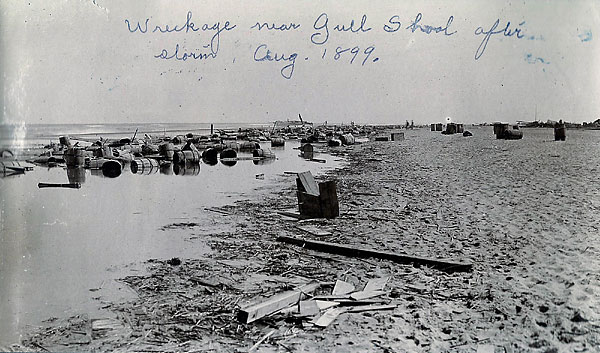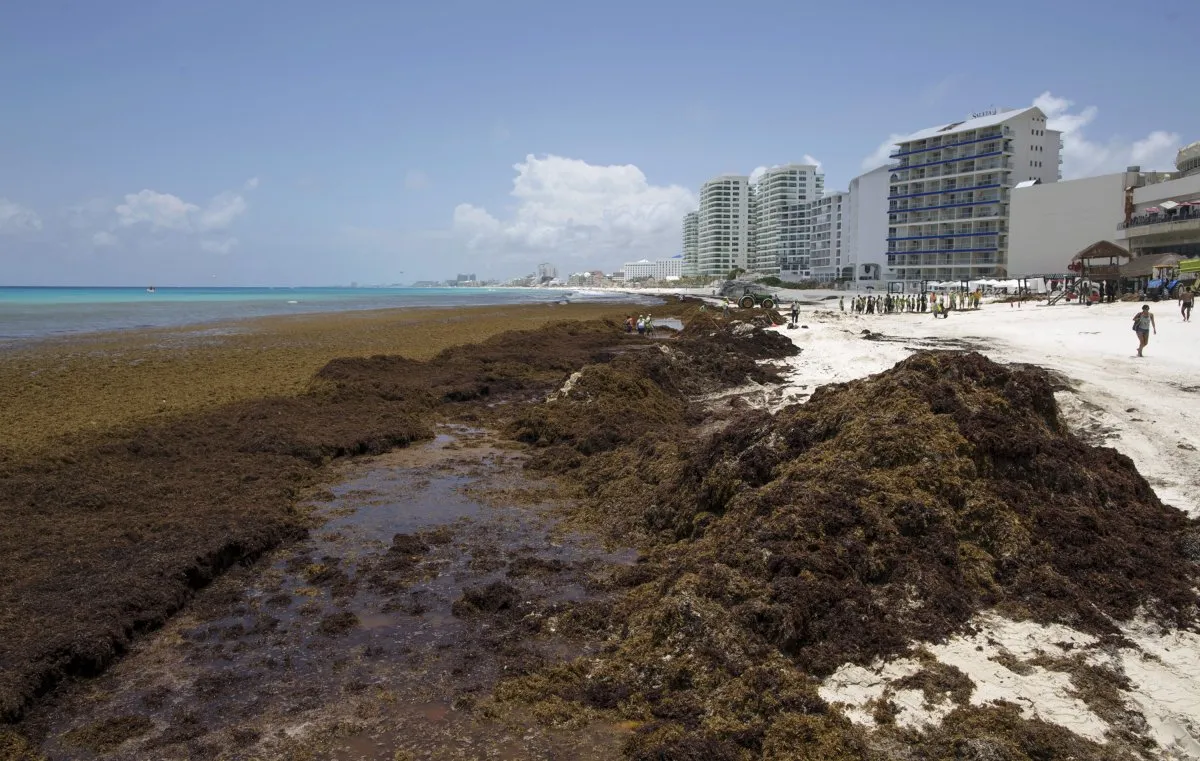“Wolves in Sheep’s Clothing”
A Sermon Series in Jude
“The Peace of the Church Must be Guarded”
Jude vv. 12-16
Introduction
An urban “Legend has it that in the 1700s Nags Head, North Carolina was home to a group of ruthless land pirates known as “wreckers” (sometimes also called “bankers” or “mooncussers”[1]). These men would hang lanterns around the necks of “nags” (horses or mules) and slowly walk the animals up and down the beach at night. Out in the darkness of the Atlantic Ocean, a ship would mistake the bobbing light for the light of another ship. Figuring the other ship had found safe passage around the dangerous shoals just off the island, the ship in the darkness would turn inland and run aground on Diamond Shoals.
In the mornings, the “wreckers” would walk along the shoreline to gather up whatever timber or other goods the tide had brought in from the wrecked ships. The found loot was then sold for profit. Even now visitors to Nags Head are shown old houses that were supposedly built and furnished with material taken from these shipwrecks, and the assumption is that Nags Head got its name from the practice of the land pirates hanging the lanterns around the necks of the nags. Estimates say that over 2,000 ships perished off this coast during that time period, with many of the shipwrecks being ships that were fooled by the “wreckers.”[2]

This group of pirates encouraged ships to run aground so they could plunder them – Jude is going to warn us today of dangerous people who seek to get into churches to run them into rocks and splinter them all to pieces.
Prayer
Identifying Dangerous People (vv. 12-13)
These are hidden reefs at your love feasts, as they feast with you without fear, shepherds feeding themselves; waterless clouds, swept along by winds; fruitless trees in late autumn, twice dead, uprooted; wild waves of the sea, casting up the foam of their own shame; wandering stars, for whom the gloom of utter darkness has been reserved forever.
(v. 12)“These are hidden reefs at your love feasts, as they feast with you without fear,” – This is the picture of rocks just below the water’s surface. You can’t see them until it’s too late and your ship has hit them. “These people” that have snuck into the church unnoticed are unseen dangers.
Jude mentions “love feasts” – these are meals typically celebrated around the Lord’s Supper. “Believers would gather to worship, hear the teaching of Scripture, celebrate Communion, and then share their common love in a meal (Acts 2:42).”[3] 1 Corinthians 11:20-22 Paul is talking about how the church in Corinth was celebrating the Lord’s Supper – which typically had a dinner, a love feast, that the church participated in together, but “When you come together, it is not the Lord’s supper that you eat. 21 For in eating, each one goes ahead with his own meal. One goes hungry, another gets drunk. 22 What! Do you not have houses to eat and drink in?”
Paul’s warning is that they had lost the meaning of why they were assembling together. Similar to this, Jude’s warning is that while they are sitting there sharing a meal and celebrating what Christ had done (the Lord’s Supper) there hidden amongst the crowd are dangerous people – like rocks right below the water. The danger is that the fellowship (that you would normally gain at the Lord’s Supper) would be destroyed.
The Church Must Guard its Fellowship – Be a Peacemaker.
Jesus said, “Blessed are the peacemakers, for they shall be called sons of God” (Matthew 5:9). Watch out for peace-breakers for they shall be called apostates. Jesus’ blessing is on those who fight for peace, and they are called sons of God because they are recognized as having fought for peace. It’s not just that they like peace, but that they actively go after and fight for peace – they make
Satan knows that if he can get the church involved in a conflict and get people to start taking sides, and start fighting, gossiping and slandering each other – no one will be saved as long as the church is fighting. Love, peace, and fellowship is the harvest field for salvations.
So how do we spot the rocks just below the surface that seek to destroy our fellowship? Jude gives several metaphors to help the church identify them (or these):
Providing For Themselves
1) shepherds feeding themselves; God gave us the gift of church fellowship, the celebration of Communion unites the church together – however the apostate “wolf in sheep’s clothing” is no concerned with how their actions and behaviors cause terrible damage to the church. They only care about themselves. These false teachers and shepherds only shepherd themselves at the expense of everyone else.
Ezekiel 34:2-4 “Thus says the Lord God: Ah, shepherds of Israel who have been feeding yourselves! Should not shepherds feed the sheep? 3 You eat the fat, you clothe yourselves with the wool, you slaughter the fat ones, but you do not feed the sheep. 4 The weak you have not strengthened, the sick you have not healed, the injured you have not bound up, the strayed you have not brought back, the lost you have not sought, and with force and harshness you have ruled them.”
Promising but Not Producing
2) waterless clouds, swept along by winds; Like clouds without rain, they are filled with empty promises. In an agricultural culture, farmers depend upon the rain to water their crops. If it doesn’t rain, the crops will dry up and die. So, the farmer looks up in a drought and sees the promise of rain in the clouds, but it never rains. You see it coming, and it is blown along – never giving any rain.
They look like church people, they act like church people, they talk like church people, but they do not contribute to the mission of the church. Solomon said it like this, Proverbs 25:14 “Like clouds and wind without rain is a man who boasts of a gift he does not give.” At the end of the day they just don’t do anything, there is no spiritual fruit. “These false teachers lack the life-giving sustenance of the living water of the gospel, and thus they are blown aimlessly by the winds of personal whims and doctrinal confusion.”[4]
Powerless and Spiritually Dead
3) fruitless trees in late autumn, twice dead, uprooted; “In the Middle East, the harvest falls well before late autumn, the season when trees shed their leaves. Late autumn is not a season when fruit would be expected.”[5] So the picture we are to see is of trees leafless and bare, with winter approaching. They have no fruit and there is no way there is fruit coming any time soon. Jude 19 says that these apostates are “devoid of the Spirit.” Fruit will never be present because they do not have the Holy Spirit within them. They have no power in and of themselves.
All fruit trees appear dead in the winter, but in the Spring life returns (once dead), but for the apostate they appear spiritually dead and they never produce spiritual fruit ever (twice dead). So what do you do with a fruitless twice dead tree? You could prune it, but there is no life in the tree so that’s a waste of time. You could transplant it, or graft it to another tree but it is still dead – so that doesn’t work either. You uproot it.
John the Baptist put it like this, Matthew 3:10 “Even now the axe is laid to the root of the trees. Every tree therefore that does not bear good fruit is cut down and thrown into the fire.” Jesus put it like this in John 15:6 “If anyone does not abide in me he is thrown away like a branch and withers; and the branches are gathered, thrown into the fire, and burned.” The branch withers because there is no life in it, it is dead.
How do we recognize these rocks below the surface that seeks to destroy the fellowship of the church? Jesus put it like this, “You will recognize them by their fruits.” (Matthew 7:16). The apostate is fruitless.
Trash Overflowing from the Heart
(v. 13) 4) wild waves of the sea, casting up the foam of their own shame; This is reference to a person’s heart being spilled out for others to see. When the storms on the ocean grow, it churns what is underneath. Raging waves brings things to the surface. Isaiah 57:20 says it like this, “But the wicked are like the tossing sea; for it cannot be quiet, and its waters toss up mire and dirt.”
One year our family went on vacation at Mexico beach Florida and a storm appeared out on the ocean. The next day after raining and storming all night seaweed began to wash up on the shore, and it kept coming for days. Until it was several feet high and began to stink. The city decided to dig a trench with large equipment and then bury the seaweed.
When the apostate is bumped trash will spill out of their heart, and their lives are like a storm on the ocean always in chaos and conflict upon chaos – there is no peace in their hearts.

Purposeless
5) wandering stars, for whom the gloom of utter darkness has been reserved forever. – The purpose of a star is give off light, and when we look up we see the stars fixed, constant, in the night’s sky, and so we are able to navigate by them. The shooting star, however, is not fixed, nor constant, and it comes and goes. So this metaphor deals with purpose. The star is to guide, to remain constant – but the wandering sky moves, is unpredictable, and is of no use to the navigator. Kids say, “wow” as they see a shooting star, but it doesn’t help navigate.
The punishment for this wandering, purposeless star is eternal utter darkness. The star that chooses not to shine, is stuck in that state forever. We were designed to have a relationship with God and serve Him and worship as our Creator. God allows us the freedom to choose to have a relationship or not – but there will come a day when we will be stuck in that decision forever (forgiven and saved or unforgiven and lost). Wandering stars never fulfill their God given purpose.
In Christ a person is 1) filled with the Holy Spirit and they grow in being selfless and serve others, 2) they use their God-given gifts for the Lord, 3) there is spiritual fruit in their lives, 4) when they are bumped by life – Jesus spills out, and 5) they have purpose that they fulfill.
The Consequences Has Always Been the Same (vv. 14-15)
14 It was also about these that Enoch, the seventh from Adam, prophesied, saying, “Behold, the Lord comes with ten thousands of his holy ones, 15 to execute judgment on all and to convict all the ungodly of all their deeds of ungodliness that they have committed in such an ungodly way, and of all the harsh things that ungodly sinners have spoken against him.”
We first meet Enoch in Genesis 5:24 “Enoch walked with God, and he was not, for God took him.” So he was a man who was faithful to the Lord, “he walked with God.” He never died, “for God took him.” Jude tells us that even before the flood, during the days of Noah prophets were warning against apostates. This is the first prophecy given in the Bible and it deals with the punishment of sin. The consequence of “these people” has always been the same – judgement for the ungodly.
Enoch’s prophecy specifically speaks of “the Lord coming,” and with him will be “ten thousands of his holy ones,” We now know this is referencing Jesus’ return. When Jesus arrived the first time, it was a suffering savior, when He returns the second time, it will be in judgement of the world, “to convict all the ungodly of all their deeds.”
Jesus told this parable regarding judgement, Luke 12:47-48 “And that servant who knew his master’s will but did not get ready or act according to his will, will receive a severe beating. 48 But the one who did not know, and did what deserved a beating, will receive a light beating. Everyone to whom much was given, of him much will be required, and from him to whom they entrusted much, they will demand the more.” The apostate knows the will of God, but never believes in faith, nor submits to the will of God – so while they know the truth they do not trust in the truth. This judgement coming from God, predicted by Enoch, will be severe because they knew better, but chose to be ungodly.
Final characteristics of Dangerous People (v. 16)
16 These are grumblers, malcontents, following their own sinful desires; they are loud-mouthed boasters, showing favoritism to gain advantage.
(v. 16) These are grumblers, – Like the Israelites in the wilderness murmurings and grumbling against God (Ex. 16:7-9; Numbers 14:27, 29), they grumbled against God’s holy law.
malcontents, the root meaning of this word is to find fault, or to blame and is a description of a person who is perpetually discontent and dissatisfied. The irony is that they are not content with the state of their life, and complain – but it is their own fault that their life is the way that it is.
following their own sinful desires; These false teachers fight against God because at the end of the day, they want to be able to follow their own sinful desires of their hearts.
they are loud-mouthed boasters, – “great swelling words.” “They pompously puffed themselves up with an elaborate, sophisticated religious vocabulary that had an external spiritual tone and attractiveness but was void of divine truth and substance.”[6] They boast to make themselves look good, or more spiritual than they actually are. The language also seems to indicate that these boasters are looking for ways to make themselves look good to people they depend upon for their living.
showing favoritism to gain advantage – The apostates are good at telling people what they wanted to hear. 2 Timothy 4:3-4 “For the time is coming when people will not endure sound teaching, but having itching ears they will accumulate for themselves teachers to suit their own passions, 4 and will turn away from listening to the truth and wander off into myths.” Apostate teachers tell the people what they want to hear, so they can keep a crowd – to gain an advantage. A teacher who truly loves you and wants what’s best for you will teach the full council of God’s Word, not just what you like, agree with, or makes you feel good.
If you ever go to New York, Without a doubt, the most popular gift item (other than a I love NY t-shirt of sticker) is the ten-dollar Rolex watch. They look real, so long as you don’t look too closely. But you couldn’t rely on one to keep accurate time. Not even close. As far as watches go, they weren’t worth the ten dollars.

These fake Rolexes (Fauxlexes) are big sellers for one reason: somewhere, other than in China Town, there are real Rolexes. If there weren’t real ones somewhere, there wouldn’t be a market for the fake ones. These knockoffs owed their very existence to the public’s desire for the original.
Jesus warned His followers that there would be no shortage of false prophets in the world. So, we shouldn’t be surprised that there are wolves in sheep’s clothing in the Church, and we certainly shouldn’t allow them to cause us to question the truth of the Gospel. Charlatans exist because the real thing exists. They are not the truth, but they are proof of the truth. Jude gives us a description of what these false teachers and apostates will be like – we must be on the lookout because of the danger they present.
“Watch out for false prophets. They come to you in sheep’s clothing, but inwardly they are ferocious wolves” (Matthew 7:15).
_________________
[1] https://www.piratesahoy.net/threads/wreckers-mooncussers-and-lifeguards.18922/
[2] https://russellmckinney.com/2024/02/03/temptations-wreckers-2/ *There is no historical evidence that this actually happened.
[3] John MacArthur, The MacArthur New Testament Commentary, 2 Peter & Jude (Chicago Illinois; Moody Publishers, 2005) 180.
[4] Matthew S. Harmon, ESV Expository Commentary, Volume XII, Hebrews-Revelation (Wheaton, Illinois; Crossway Publishing, 2018) 515.
[5] O. S. Osborne, In Sheep’s Clothing, Jude’s Urgent Warning about Apostasy in the Church (Neptune, New Jersey; Loizeaux Publishing, 1994) 78.
[6] MacArthur, 190.